新世纪大学英语综合教程4课文翻译Unit7
(完整版)Unit7TheMonster课文翻译综合教程四
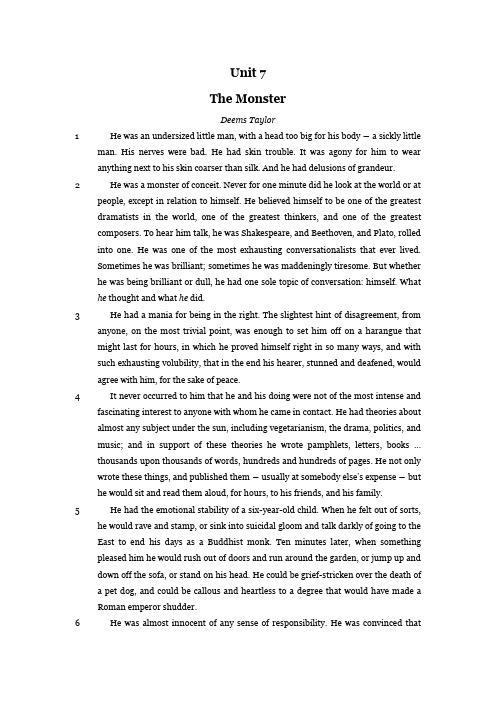
Unit 7The MonsterDeems Taylor1He was an undersized little man, with a head too big for his body ― a sickly little man. His nerves were bad. He had skin trouble. It was agony for him to wear anything next to his skin coarser than silk. And he had delusions of grandeur.2He was a monster of conceit. Never for one minute did he look at the world or at people, except in relation to himself. He believed himself to be one of the greatest dramatists in the world, one of the greatest thinkers, and one of the greatest composers. To hear him talk, he was Shakespeare, and Beethoven, and Plato, rolled into one. He was one of the most exhausting conversationalists that ever lived.Sometimes he was brilliant; sometimes he was maddeningly tiresome. But whether he was being brilliant or dull, he had one sole topic of conversation: himself. What he thought and what he did.3He had a mania for being in the right. The slightest hint of disagreement, from anyone, on the most trivial point, was enough to set him off on a harangue that might last for hours, in which he proved himself right in so many ways, and with such exhausting volubility, that in the end his hearer, stunned and deafened, would agree with him, for the sake of peace.4It never occurred to him that he and his doing were not of the most intense and fascinating interest to anyone with whom he came in contact. He had theories about almost any subject under the sun, including vegetarianism, the drama, politics, and music; and in support of these theories he wrote pamphlets, letters, books ...thousands upon thousands of words, hundreds and hundreds of pages. He not only wrote these things, and published them ― usually at somebody else’s expense ― but he would sit and read them aloud, for hours, to his friends, and his family.5He had the emotional stability of a six-year-old child. When he felt out of sorts, he would rave and stamp, or sink into suicidal gloom and talk darkly of going to the East to end his days as a Buddhist monk. Ten minutes later, when something pleased him he would rush out of doors and run around the garden, or jump up and down off the sofa, or stand on his head. He could be grief-stricken over the death ofa pet dog, and could be callous and heartless to a degree that would have made aRoman emperor shudder.6He was almost innocent of any sense of responsibility. He was convinced thatthe world owed him a living. In support of this belief, he borrowed money from everybody who was good for a loan ― men, women, friends, or strange rs. He wrote begging letters by the score, sometimes groveling without shame, at others loftily offering his intended benefactor the privilege of contributing to his support, and being mortally offended if the recipient declined the honor.7What money he could lay his hand on he spent like an Indian rajah. No one will ever know ― certainly he never knows ― how much money he owed. We do know that his greatest benefactor gave him $6,000 to pay the most pressing of his debts in one city, and a year later had to give him $16,000 to enable him to live in another city without being thrown into jail for debt.8He was equally unscrupulous in other ways. An endless procession of women marched through his life. His first wife spent twenty years enduring and forgiving his infidelities. His second wife had been the wife of his most devoted friend and admirer, from whom he stole her. And even while he was trying to persuade her to leave her first husband he was writing to a friend to inquire whether he could suggest some wealthy woman ― any wealthy woman ― whom he could marry for her money.9He had a genius for making enemies. He would insult a man who disagreed with him about the weather. He would pull endless wires in order to meet some man who admired his work and was able and anxious to be of use to him ― and would proceed to make a mortal enemy of him with some idiotic and wholly uncalled-for exhibition of arrogance and bad manners. A character in one of his operas was a caricature of one of the most powerful music critics of his day. Not content with burlesquing him, he invited the critic to his house and read him the libretto aloud in front of his friends.10The name of this monster was Richard Wagner. Everything I have said about him you can find on record ― in newspapers, in police reports, in the testimony of people who knew him, in his own letters, between the lines of his autobiography.And the curious thing about this record is that it doesn’t matter in the least.11Because this undersized, sickly, disagreeable, fascinating little man was right all the time, the joke was on us. He was one of the world’s greatest dramatists; he was a great thinker; he was one of the most stupendous musical geniuses that, up to now, the world has ever seen. The world did owe him a living. What if he did talk about himself all the time? If he talked about himself for twenty-four hours every day for the span of his life he would not have uttered half the number of words that othermen have spoken and written about him since his death.12When you consider what he wrote ― thirteen operas and music dramas, eleven of them still holding the stage, eight of them unquestionably worth ranking among the world’s great musico-dramatic masterpieces ― when you listen to what he wrote, the debts and heartaches that people had to endure from him don’t seem much of a price.13What if he was faithless to his friends and to his wives? He had one mistress to whom he was faithful to the day of his death: Music. Not for a single moment did he ever compromise with what he believed, with what he dreamed. There is not a line of his music that could have been conceived by a little mind. Even when he is dull, or downright bad, he is dull in the grand manner. Listening to his music, one does not forgive him for what he may or may not have been. It is not a matter of forgiveness. It is a matter of being dumb with wonder that his poor brain and body didn’t burst under the torment of the demon of creative energy that lived inside him, struggling, clawing, scratching to be released; tearing, shrieking at him to write the music that was in him. The miracle is that what he did in the little space of seventy years could have been done at all, even by a great genius. Is it any wonder he had no time to be a man?畸人迪姆斯·泰勒1 他是个大头小身体、病怏怏的矬子;成日神经兮兮,皮肤也有毛病。
全新版大学英语综合教程4课后习题翻译Unit3-7
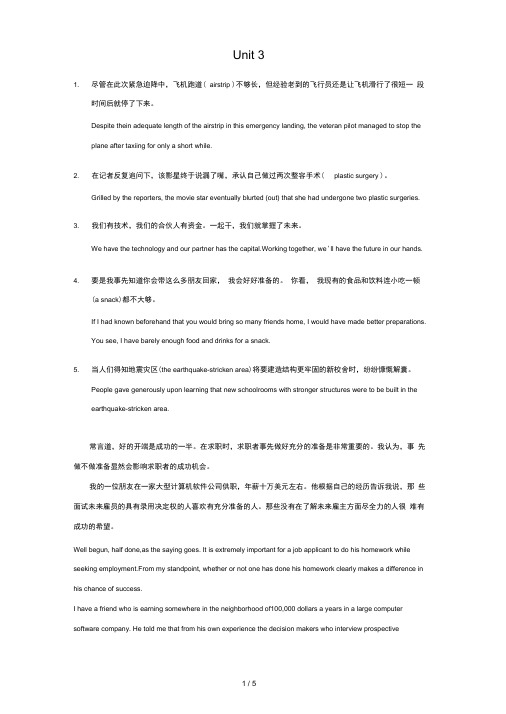
1. 尽管在此次紧急迫降中,飞机跑道( airstrip )不够长,但经验老到的飞行员还是让飞机滑行了很短一段时间后就停了下来。
Despite thein adequate length of the airstrip in this emergency landing, the veteran pilot managed to stop the plane after taxiing for only a short while.2. 在记者反复追问下,该影星终于说漏了嘴,承认自己做过两次整容手术( plastic surgery )。
Grilled by the reporters, the movie star eventually blurted (out) that she had undergone two plastic surgeries.3. 我们有技术,我们的合伙人有资金。
一起干,我们就掌握了未来。
We have the technology and our partner has the capital.Working together, we'll have the future in our hands.4. 要是我事先知道你会带这么多朋友回家,我会好好准备的。
你看,我现有的食品和饮料连小吃一顿(a snack)都不大够。
If I had known beforehand that you would bring so many friends home, I would have made better preparations.You see, I have barely enough food and drinks for a snack.5. 当人们得知地震灾区(the earthquake-stricken area)将要建造结构更牢固的新校舍时,纷纷慷慨解囊。
全新版大学英语综合教程4课文原文及翻译
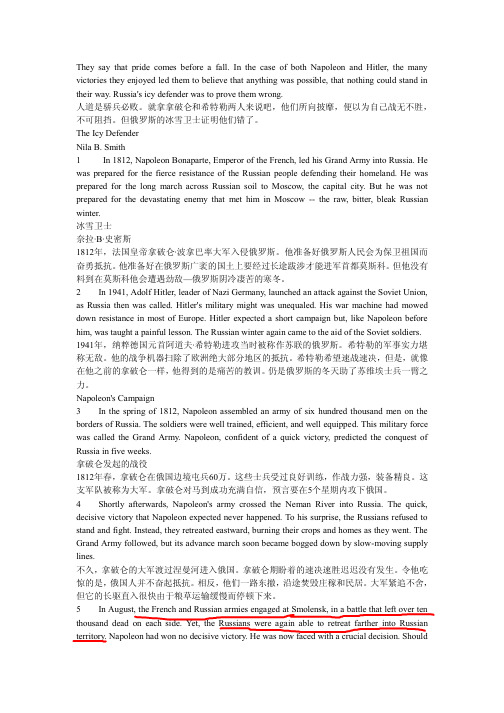
A4 新标准大学英语综合教程4课文翻译1-10单元

Unit 1Active reading (1)大学毕业找工作的第一要义:别躺在沙发上做梦今年夏天,超过65万的大学生毕业离校,其中有许多人根本不知道怎么找工作。
在当今金融危机的背景下,做父母的该如何激励他们?七月,你看着21岁英俊的儿子穿上学士袍,戴上四方帽,骄傲地握着优等学士学位证书,拍毕业照。
这时,记忆中每年支付几千英镑,好让儿子吃好、能偶尔参加聚会的印象开始消退。
但现在,你又不得不再考虑钱的问题。
等到暑假快要结束,全国各地的学生正在为新学期做准备的时候,你发现大学毕业的儿子还歪躺在沙发上看电视。
他只是偶尔走开去发短信,浏览社交网站Facebook,去酒吧喝酒。
这位前“千禧一代”的后裔一夜之间变成了“哼哼一代”的成员。
他能找到工作吗?这就是成千上万家庭所面临的景象:今年夏天,超过65万大学生毕业,在当今金融危机的背景下他们中的大多数人不知道自己下一步该做什么。
父母只会唠叨,而儿女们则毫无缘由地变成了叛逆者,他们知道自己该找份工作,但却不知道如何去找。
来自米德尔塞克斯郡的杰克·古德温今年夏天从诺丁汉大学政治学系毕业,获得二级一等荣誉学士学位。
他走进大学就业服务中心,又径直走了出来,因为他看见很多人在那里排长队。
跟他一起住的另外5个男孩也都跟他一样,进去又出来了。
找工作的压力不大,虽然他所认识的大多数女生都有更明确的计划。
他说:“我申请政治学研究工作,但被拒了。
他们给的年薪是1万8千镑,交完房租后所剩无几,也就够买一罐煮豆子,可他们还要有研究经历或硕士学位的人。
然后我又申请了公务员速升计划,并通过了笔试。
但在面试时,他们说我‘太冷漠’了,谈吐‘太像专家治国论者’。
我觉得自己不可能那样,但我显然就是那样的。
”打那以后他整个夏天都在“躲”。
他能够轻松复述《交通警察》中的若干片段,他白天看电视的时间太多,已经到了影响健康的地步。
跟朋友谈自己漫无目标的日子时,他才发现他们的处境和自己的并没有两样。
新世纪大学英语综合教程4课文翻译Unit7
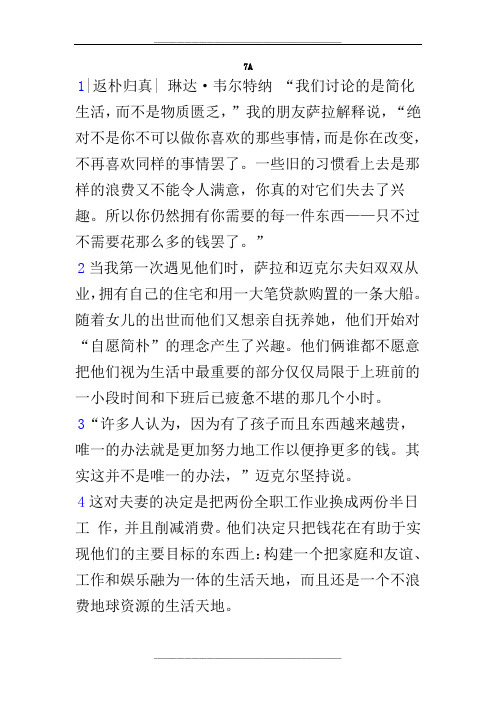
7A1|返朴归真| 琳达·韦尔特纳“我们讨论的是简化生活,而不是物质匮乏,”我的朋友萨拉解释说,“绝对不是你不可以做你喜欢的那些事情,而是你在改变,不再喜欢同样的事情罢了。
一些旧的习惯看上去是那样的浪费又不能令人满意,你真的对它们失去了兴趣。
所以你仍然拥有你需要的每一件东西——只不过不需要花那么多的钱罢了。
”2当我第一次遇见他们时,萨拉和迈克尔夫妇双双从业,拥有自己的住宅和用一大笔贷款购置的一条大船。
随着女儿的出世而他们又想亲自抚养她,他们开始对“自愿简朴”的理念产生了兴趣。
他们俩谁都不愿意把他们视为生活中最重要的部分仅仅局限于上班前的一小段时间和下班后已疲惫不堪的那几个小时。
3“许多人认为,因为有了孩子而且东西越来越贵,唯一的办法就是更加努力地工作以便挣更多的钱。
其实这并不是唯一的办法,”迈克尔坚持说。
4这对夫妻的决定是把两份全职工作业换成两份半日工作,并且削减消费。
他们决定只把钱花在有助于实现他们的主要目标的东西上:构建一个把家庭和友谊、工作和娱乐融为一体的生活天地,而且还是一个不浪费地球资源的生活天地。
5现在他们还在原来的那个近郊社区,住在一幢自己设计的、漂亮而节能的房子里。
按许多标准来看,房子虽然小了点,却容易清扫、布置、维修和供暖。
一层是个大房间,厨房靠墙,摆着一张桦木餐桌和吃饭用的几把椅子;一张舒适的长沙发和一个柴炉就把日常起居的范围圈定了;角落是工作区。
楼上是他们的卧室、一个萨拉和迈克尔共用的办公室和一间浴室。
整幢房子明亮简洁,同周围环境十分和谐。
很快,前门外还要建一个太阳能温室。
6一对只有兼职工作的夫妻怎么会有钱建造自己的房子、拥有一辆汽车并同另一对夫妻共享一艘小船,而且所有这一切都不曾贷款呢?他们如何能够维持足以提供他们想要的“一切”的那样一种高生活水平呢?他们放弃的而且不再怀念是哪些东西呢?7首先,他们放弃了乱七八糟的昂贵东西:(浴室)药柜里满满的从来不用的化妆品和在柜台上随时可以买到的药品;堆放在厨房壁柜里的最终只会丢弃的各种东西。
新世纪大学英语综合教程4 Unit7

Here is a story of two people whose rebellion against the trend of the modern world went all the way. As Linda Weltner reports, Sara and Michael decided that the world was too much with them, and that they could live much happier lives without the myths of consumerism and the thrownaway mentality. One wonders just how many of us could make such a drastic change in our lifestyle.Stripping Down to Bare HappinessLinda Weltner1)"What we're talking about is simplification, not deprivation," explains Sara, afriend of mine. "It isn't that you can't do all the things you like, but you change.You don't like them anymore. Some of the old habits seem so wasteful and unsatisfying that you really lose your taste for them. So you still have everything you want – only on less money."2)When I first met them, Sara and Michael were a two-career couple with a homeof their own, and a large boat bought with a large loan. They began to take an interest in the concept of "voluntary simplicity" with the birth of their daughter whom they wanted to raise all by themselves. Neither one of them, it turned out, was willing to restrict what they considered their "real life" into the brief time before work and the tired hours afterward.3)"A lot of people think that as they have children and things get more expensive,the only answer is to work harder in order to earn more money. It's not the only answer," insists Michael.4)The couple's decision was to trade two full-time careers for two half-time careers,and to curtail consumption. They decided to spend their money only on things that contributed to their major goal, the construction of a world where family and friendship, work and play, were all of a piece, a world, moreover, which did not make wasteful use of the earth's resources.5)Today, they live in the same suburban community in a handsome,energy-efficient home they designed themselves. Small by most standards, it is easy to clean, furnish, maintain and heat. The first floor, one large room, has a kitchen area along one wall, a birch table and chairs for dining, a living area defined by a comfortable couch and a wood stove, and a corner work area.Upstairs is their bedroom, an office that serves them both, and a bathroom. It is bright and light and in harmony with its surroundings. Soon there will be a solar greenhouse outside the front door.6)How can a couple with two part-time freelance jobs afford to build their ownhome, own a car, and share a small boat with another couple – all without a loan?How can they maintain a high standard of living that provides "everything" they want? What is it they have given up that they do not miss?7)For one thing, they have given up all the expensive clutter – medicine cabinetsfull of cosmetics and over-the-counter drugs they will never use; kitchen cabinets crowded with items they would eventually throw away. The one clothes closet Sara shares with Michael easily contains the basic items in their wardrobes, many of them well-made classic styles from L. L. Bean. "I'm constantly giving things away," Sara explains. By sifting and discarding, by keeping track of what they have, Sara and Michael have a clear idea of what they really need.8)They do not have a dishwasher. The number of hand-thrown pottery dishes theyown would not fill one. They do not own a clothes dryer; the wet clothes, drying indoors in winter, eliminate the need for a humidifier. Sara's dark hair is short.She does not need a hairdryer, electric curlers, or a curling iron. Their front yard is wooded. They do not need a power mower or electric clippers. They do not own a TV, and so they and their child are not constantly saturated with images of new toys, new things, and new temptations.9)They have exchanged the expenses of work in a commuter age – the extra car,the cost of gasoline, professional wardrobes, lunches and frequent dinners out, and babysitting fees – or the time to pay attention to the quality of their lives.They have given up paper products, processed foods, expensive hobbies, first-run movies, restaurants, and paying for the services of others. In return, they enjoy home cooking, mid-week family picnics, library books, participation in community arts programs, thrift shops, and do-it-yourself projects.10)"That yearning feeling that's so much a part of this culture goes on forever," saysSara. "But it doesn't matter if you're making $15,000 or $50,000. There'll always be the things you wish you could afford. Money really wasn't the reason we changed. We did it for our own personal satisfaction, and for anyone thinking of simplifying life, there is only one basic rule: If it isn't satisfying, don't do it." 11)Sara and Michael lent me their copy of 99 Ways to a Simple Lifestyle, a handbookof practical suggestions that can be applied to anyone's living situation. I read it carefully, giving myself high marks in some areas, surprised at my socially sanctioned irrational behavior in others.12)That night, accompanying my daughter on a shopping trip, I came across aninexpensive hand towel that matched our kitchen wallpaper, and a pair of "bargain" sandals too handsome to resist. When I stood in the parking lot, $11 poorer, no happier on leaving the store than I had been entering it, I felt like a child, helpless in the face of my own impulses.13)It is a world of illusion, this shopping merry-go-round we ride, but with all theaction and excitement, it is sometimes hard to find the resolve and the courage to dismount.。
秦秀白《新世纪大学英语综合教程(4)》(课文精解 Unit 7)【圣才出品】
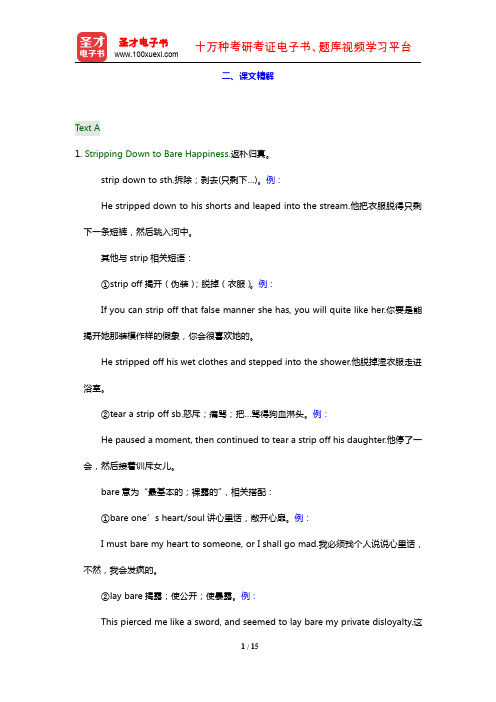
二、课文精解Text A1.Stripping Down to Bare Happiness.返朴归真。
strip down to sth.拆除;剥去(只剩下…)。
例:He stripped down to his shorts and leaped into the stream.他把衣服脱得只剩下一条短裤,然后跳入河中。
其他与strip相关短语:①strip off揭开(伪装);脱掉(衣服)。
例:If you can strip off that false manner she has,you will quite like her.你要是能揭开她那装模作样的假象,你会很喜欢她的。
He stripped off his wet clothes and stepped into the shower.他脱掉湿衣服走进浴室。
②tear a strip off sb.怒斥;痛骂;把…骂得狗血淋头。
例:He paused a moment,then continued to tear a strip off his daughter.他停了一会,然后接着训斥女儿。
bare意为“最基本的;裸露的”,相关搭配:①bare one’s heart/soul讲心里话,敞开心扉。
例:I must bare my heart to someone,or I shall go mad.我必须找个人说说心里话,不然,我会发疯的。
②lay bare揭露;使公开;使暴露。
例:This pierced me like a sword,and seemed to lay bare my private disloyalty.这句话象一把利剑刺透了我,似乎把我私下的不忠不义揭露了出来。
bare与naked均有“裸露的”之意,区别:bare形容物时,指没有遮盖或装饰;形容人时,指身体某一部位裸露。
naked形容人时,指完全不穿衣服,一丝不挂;还可指“无掩饰的、坦白的、赤裸裸的”。
Unit7TheMonster课文翻译综合教程四

Unit 7The Monst erDeems Taylor1He was an un dersized littleman, with a head too big for his body ― a sickly little man. His nerves were bad. He had skin tr ouble. It was ag ony for him to w ear anything nex t to his skin co arser than silk. And he had delu sions of grandeu r.2He was amonster of conce it. Never for on e minute did helook at the worl d or at people,except in relati on to himself. H e believed himse lf to be one ofthe greatest dra matists in the w orld, one of the greatest thinke rs, and one of t he greatest comp osers. To hear h im talk, he wasShakespeare, and Beethoven, andPlato, rolled in to one. He was o ne of the most e xhausting conver sationalists tha t ever lived.So metimes he was b rilliant; someti mes he was madde ningly tiresome. But whether hewas being brilli ant or dull, hehad one sole top ic of conversati on: himself. Wha t he thought and what he did.3He had a mania for being in th e right. The sli ghtest hint of d isagreement, fro m anyone, on the most trivial po int, was enoughto set him off o n a harangue tha t might last for hours, in which he proved himse lf right in so m any ways, and wi th such exhausti ng volubility, t hat in the end h is hearer, stunn ed and deafened, would agree wit h him, for the s ake of peace.4It never occur red to him thathe and his doing were not of the most intense an d fascinating in terest to anyone with whom he ca me in contact. H e had theories a bout almost anysubject under th e sun, including vegetarianism,the drama, polit ics, and music;and in support o f these theories he wrote pamphl ets, letters, bo oks ...thousand s upon thousands of words, hundr eds and hundreds of pages. He no t only wrote the se things, and p ublish ed them ―usually at someb ody else’s expen se ― but he woul d sit and read t hem aloud, for h ours, to his fri ends, and his fa mily.5He had the emotional s tability of a si x-year-old child. When he felt o ut of sorts, hewould rave and s tamp, or sink in to suicidal gloo m and talk darkl y of going to th e East to end hi s days as a Budd hist monk. Ten m inutes later, wh en something ple ased him he woul d rush out of do ors and run arou nd the garden, o r jump up and do wn off the sofa, or stand on his head. He couldbe grief-stricke n over the death ofa pet dog, a nd could be call ous and heartles s to a degree th at would have ma de aRoman emper or shudder.6He was almost in nocent of any se nse of responsib ility. He was co nvinced that theworld owed hima living. In sup port of this bel ief, he borrowed money from ever ybody who was go od for a loan ―men, women, frie nds, or stranger s. He wrote begg ing letters by t he score, someti mes groveling wi thout shame, atothers loftily o ffering his inte nded benefactorthe privilege of contributing to his support, an d being mortally offended if the recipient decli ned the honor.7What money he could lay his h and on he spentlike an Indian r ajah. No one wil l ever know ― ce rtainly he never knows ― how muc h money he owed. We do know that his greatest be nefactor gave hi m $6,000 to paythe most pressin g of his debts i n one city, anda year later had to give him $16,000 to enable h im to live in an other city witho ut being throwninto jail for de bt.8He was e qually unscrupul ous in other way s. An endless pr ocession of wome n marched throug h his life. Hisfirst wife spent twenty years en during and forgi ving his infidel ities. His secon d wife had beenthe wife of hismost devoted fri end and admirer, from whom he st ole her. And eve n while he was t rying to persuad e her to leave h er first husband he was writingto a friend to i nquire whether h e could suggestsome wealthy wom an ― any wealt hy woman ― whom he could marry for her money.9He had a geniusfor making enemi es. He would ins ult a man who di sagreed with him about the weath er. He would pul l endless wiresin order to meet some man who ad mired his work a nd was able andanxious to be of use to him ― an d would proceedto make a mortal enemy of him wi th some idioticand wholly uncal led-for exhibiti on of arroganceand bad manners. A character inone of his opera s was a caricatu re of one of the most powerful m usic critics ofhis day. Not con tent with burles quing him, he in vited the critic to his house an d read him the l ibretto aloud in front of his fr iends.10The n ame of this mons ter was RichardWagner. Everythi ng I have said a bout him you can find on record― in newspapers, in police repor ts, in the testi mony of people w ho knew him, inhis own letters, between the lin es of his autobi ography.And the curious thing a bout this record is that it does n’t matter in th e least.11Bec ause this unders ized, sickly, di sagreeable, fasc inating little m an was right all the time, the j oke was on us. H e was one of the world’s greates t dramatists; he was a great thi nker; he was one of the most stu pendous musicalgeniuses that, u p to now, the wo rld has ever see n. The world did owe him a livin g. What if he di d talk about him self all the tim e? If he talkedabout himself fo r twenty-four ho urs every day fo r the span of hi s life he wouldnot have uttered half the number of words that o thermen have sp oken and written about him since his death.12When you conside r what he wrote― thirteen opera s and music dram as, eleven of th em still holding the stage, eigh t of them unques tionably worth r anking among the wor ld’s great m usico-dramatic m asterpieces ― wh en you listen to what he wrote,the debts and he artaches that pe ople had to endu re from him don’t seem much of a price.13W hat if he was fa ithless to his f riends and to hi s wives? He hadone mistress towhom he was fait hful to the dayof his death: Mu sic. Not for a s ingle moment did he ever comprom ise with what he believed, withwhat he dreamed. There is not aline of his musi c that could hav e been conceived by a little min d. Even when heis dull, or down right bad, he is dull in the gra nd manner. Liste ning to his musi c, one does notforgive him forwhat he may or m ay not have been. It is not a ma tter of forgiven ess. It is a mat ter of being dum b with wonder th at his poor brai n and body didn’t burst under th e torment of the demon of creati ve energy that l ived inside him, struggling, cla wing, scratching to be released; tearing, shriek ing at him to wr ite the music th at was in him. T he miracle is th at what he did i n the little spa ce of seventy ye ars could have b een done at all, even by a great genius. Is it a ny wonder he had no time to be a man?畸人迪姆斯·泰勒1 他是个大头小身体、病怏怏的矬子;成日神经兮兮,皮肤也有毛病。
新世纪大学英语(第二版)综合教程第4册Unit7
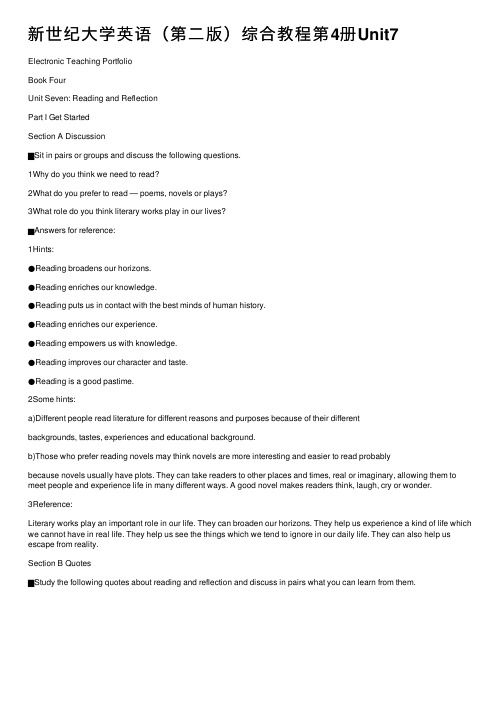
新世纪⼤学英语(第⼆版)综合教程第4册Unit7Electronic Teaching PortfolioBook FourUnit Seven: Reading and ReflectionPart I Get StartedSection A Discussion▇Sit in pairs or groups and discuss the following questions.1Why do you think we need to read?2What do you prefer to read — poems, novels or plays?3What role do you think literary works play in our lives?▆Answers for reference:1Hints:●Reading broadens our horizons.●Reading enriches our knowledge.●Reading puts us in contact with the best minds of human history.●Reading enriches our experience.●Reading empowers us with knowledge.●Reading improves our character and taste.●Reading is a good pastime.2Some hints:a)Different people read literature for different reasons and purposes because of their differentbackgrounds, tastes, experiences and educational background.b)Those who prefer reading novels may think novels are more interesting and easier to read probablybecause novels usually have plots. They can take readers to other places and times, real or imaginary, allowing them to meet people and experience life in many different ways. A good novel makes readers think, laugh, cry or wonder.3Reference:Literary works play an important role in our life. They can broaden our horizons. They help us experience a kind of life which we cannot have in real life. They help us see the things which we tend to ignore in our daily life. They can also help us escape from reality.Section B Quotes▇Study the following quotes about reading and reflection and discuss in pairs what you can learn from them.Francis Bacon⊙Some books are to be tasted; others to be swallowed; and some few to be chewed and digested.— Francis Bacon Interpretation:There are different ways of reading books. To taste a book, one can read it in a state of relaxation. To swallow a book one can glide his eyes across the lines of a book. To chew or digest a book one should read it actively. And when he has finished reading a book, the pages are filled with his notes. Only when good books are chewed and digested can they have a lasting influence on one’s life.About Francis Bacon (1561-1626): an English politician, philosopher, and writer. Francis Bacon graduated from Trinity College, Cambridge. He was the founder of English materialist philosophy, as well as of modern science in England. He is especially famous for his Essays, in which his practical wisdom is shown through his reflections and comments on rather abstract subjects.Benjamin Franklin◎Reading makes a full man, meditation a profound man, discourse a clear man.— Benjamin FranklinInterpretation:Reading broadens our horizons, molds our temperament and enlightens our minds. Reading provides us with the possibility of opening ourselves up to the world, which helps us to become learned and knowledgeable persons. Thinking deeply helpsus gain an insight into human life. Having scholarly conversations with others helps us become wiser.About Benjamin Franklin (1706-1790): a US politician, writer, and scientist. He was involved in writing two historically significant documents, the Declaration of Independence (《独⽴宣⾔》) and the Constitution of the United States (《美国宪法》). He is famous for proving that lightning is a form of electricity by doing a scientific test in which he flew a kite during a storm, and he invented the lightning conductor. He is also well known for his literary works such as Poor Richard’s Almanac (《穷理查德年鉴》1732-1757;亦译作《格⾔历书》、《穷理查历书》) and Autobiography (《⾃传》1790).Denis Parsons Burkitt◎It is better to read a little and ponder a lot than to read a lot and ponder a little.— Denis Parsons BurkittInterpretation:What really counts is not how many books we have read but whether we spend time thinking over what we have read. So we should read selectively and reflectively.About Denis Parsons Burkitt (1911–1993): an accomplished British surgeon. His major contribution to medical science was the description, distribution, and ultimately, the etiology (病因学;病源论) of apediatric (⼩⼉科的) cancer that bears his name Burkitt’s lymphoma (伯基特⽒淋巴瘤).Louisa May Alcott◎Good books, like good friends, are few and chosen; the more select, the more enjoyable.— Louisa May AlcottInterpretation:Books and friends should be few but good. We should be highly selective in reading books, and our greatest pleasure in reading comes from the best books.About Louisa May Alcott (1832–1888): an American novelist best known as author of the novel Little Women (《⼩妇⼈》). Section C Watching and Discussion▇Watch the following video clip “Reading Really Matters” and do the tasks that follow.Introduction of the video:Dana Gioia, Chairman of the National Endowment for the Arts, is talking about arts education.First he mentions a problem in the United States: People are reading less and employers are facing a serious problem that their new employees can’t read and can’t write.According to Dana Gioia, those people who read do exercise more and do more volunteering charity work.Then he comes to talk about how reading actually matters to a person.1 Now fill in the note form according to what you hear.Topic: Reading Awakens Something inside the Reader1) reading increases your sense of your own personal destiny.2) reading makes the lives of other people more real to you.In summary, reading makes you understand that other people have an inner life as complicated as your own.Reading builds a society with not only imaginative capability, intellectual capability, but compassion, and humanity.2Discuss the following questions.Do you agree that Chinese people are reading less?Do you think modern technology has influenced the way people read?Open.▇Script:Americans are reading less. Because they read less, they read less well. Because they read less well, they do less well in the educational system. We are in the process in the United States of producing the first generation in our history that’s less well-educated than their parents. Now, I mean, to me, this is, you know a…an abandonment of the whole American misroutes of self improvement. Because they do less well in school, they do less well in the job market and economically. The number one problems for new employers in the United States: new employees can’t read, new employees can’t write. And in fact, for those people who can’t even read above the basic level, 55% of those people end up unemployed.And even on a further level, they overwhelmingly are like, you know, are more likely to end up in the criminal justice system. Only 3% of the people in U.S. prisons read at a proficiency level. Because they read less well, you know, because in a sense they don’t develop these things, they are a lso less likely to be engaged in personal positive behavior however you wanna measure it.We can measure it many different ways. You would not think it, but it is overwhelmingly demonstrable: that people that read exercise more; people that read join, play sports more. They belong to civic organizations more. They do volunteering charity work nearly 4 times the level of non-readers.Well, when I saw these data, I said, well, wait. We have to be measuring something else. W e’re measuring income, and we’re measuring education. If you take the poorest people in the United States who read, they do volunteering charity work at twice the level of people who don’t read. So what does it say to us? It says something we know, each of us knows this: when you read, when you’re engaged in the arts, it awakens something inside of you. That does two things: the first is that it increases your sense of your own personal destiny. But, secondly, it makes the lives of other people more real to you. It creates a heightened sense of yourself as an individual, but it also brings you, maybe, especially when you’re reading novels or imagin ing the literature in which you follow the stories, the lives of the people in the dailiness of their existence, socially, economically. Maybe understanding, a man understanding how a woman thinks, and a man understanding how a man thinks, a person understanding how somebody from a different country, from a different race thinks and feels. This imaginative exercises, this meditative exercise, makes you understand that other people have an inner life as complicated as your own. And so, if you have a society, in which tens of millions of people guided by pleasure no less, undertake these types of contemplations and meditations, you have a society which builds… not only it’s imaginative capability, it’s intellectual capability, b ut it’s compassion, and it’s humanity.Part II Listen and RespondSection B Task One: Focusing on the Main Ideas▇Choose the best answer to each of the following questions according to the information contained in the listening passage. 1What does the speaker mean by efficient reading or reading efficiently?A)Reading a book for pleasure.B)Writing between lines while reading.C)Remembering the author’s thoughts.D)Scanning a book for facts.2What is the advantage of marking up a book according to the speaker?A)Marking up a book helps readers take in the brilliant ideas in the book.B)Marking up a book enables readers to know what they read.C)Marking up a book makes readers feel like the owner of the book.D)Marking up a book makes readers conscious of the fact that they are reading actively.3What is the true sense of owning a book?A)Marking it through active reading.B)Purchasing it with one’s own money.C)Writing one’s name on it.D)Understanding every word in it.4How do people read books for pleasure?A)They read them consciously.B)They read them in a state of relaxation.C)They read them passively.D)They read them actively.5How do people know they have read actively when they finish reading a book?A)They establish a relationship with the author.B)They gain possession of the book.C)The pages are full of their notes.D)Their spoken language has been improved.▇Key:1) B 2) D 3) A 4) B 5) CSection C Task Two: Zooming In on the Details▇Listen to the recording again and fill in each of the blanks according to what you have heard.Why is mar king up a book indispensable to reading it? First, it keeps you 1) ________. And I don’t mean merely 2)________; I mean wide awake. In the second place, reading, if it is 3) ________, is thinking, and thinking tends to 4)________ itself in words, spoken or written. The marked book is usually the thought-through book. Finally, writing helps you remember the 5) ________ you had, or the thoughts the author expressed.If reading is to 6) ________ anything more than passing time, it must be active. You can’t let your eyes glide across the lines of a book and come up with an 7) ________ of what you have read. The books you read for pleasure can be read in a state of 8) ________ and nothing is lost. But a great book, rich in ideas and beauty, a book that 9) ________ and tries to answer fundamental questions, 10) ________ the most active reading. When you’ve finished rea ding a book, and the pages are filled with your notes, you know that you read actively.▇Answers:1)awake 2) conscious 3) active 4) express 5) thoughts6) accomplish 7) understanding 8) relaxation 9) raises 10) demands▇Script:Reading EfficientlyYou know you have to read ―between the line s‖ to get the most out of anything. I want to persuade you to do something equally important in the course of your reading, that is: ―write between the lines‖. Unless you do, you are not likely to do the most efficient kind of reading. I contend that marking up a book is an act of love.There are two ways in which one can own a book. The first is the property right you establish by paying for it, just as you pay for clothes and furniture. But this act of purchase is only the prelude to possession. Full ownership comes only when you have made it a part of yourself, and the best way to make yourself a part of it is by writing in it.Why is mar king up a book indispensable to reading? First, it keeps you awake. And I don’t mean merely conscious; I meanwide awake. In the second place, reading, if it is active, is thinking, and thinking tends to express itself in words, spoken or written. The marked book is usually the thought-through book. Finally, writing helps you remember the thoughts you had, or the thoughts the author expressed.If reading i s to accomplish anything more than passing time, it must be active. You can’t let your eyes glide across the lines of a book and come up with an understanding of what you have read. The books you read for pleasure can be read in a state of relaxation and nothing is lost. But a great book, rich in ideas and beauty, a book that raises and tries to answer fundamental questions, demands the most active reading. When you’ve finished reading a book, and the pages are filled with your notes, you know that you read actively.Part III Read and ExploreText ASection A Discovering the Main IdeasExercise 1 Answer the following questions with the information contained in Text A.1What is the difference between the lives of those who read and those who do not?2Can reading newspapers be categorized as reading? Why or why not?3What is the art of reading according to the author?4What does the author think of ―the taste for reading‖?5Can people benefit from reading the same books at different ages? Why or why not?▇Answers for reference:1According to the author, those who do not read are just like prisoners confined to their immediate world in respect to time and space. Their life falls into a set of routines and they see only what happens in their immediate neighbourhood with few friends and acquaintances to communicate with. In contrast, those who read have the privilege to escape temporarily from the present world and enter a different country ora different age as soon as they pick up a book. Good books put them in touch with the best minds inhistory and they are always carried away into a world of thought and reflection. Books broaden their horizons and their life is never a set of dull routines.2According to the author, reading newspapers does not belong to the category of reading because the average reader of a newspaper is mainly concerned with getting reports about events and happenings without contemplative value. The best reading does not merely offer a report of events, but is able to lead readers into a contemplative mood.3According to the author, only reading with the object of enriching one’s charm and flavor can be called an art. The charm here is not related to one’s physical appearance, but one’s inner aura of elegance which canonly be acquired through reading. And flavor here refers to the flavor in speech, and its cultivation entirely depends on one’s way of reading.4The author thinks that taste is the key to all reading and is individual and selective. Each person has his own taste in the kinds of books he enjoys reading. Forcing one to read books that he dislikes will achieve no positive results.5Yes. People can benefit from reading the same book at different ages and get different flavors out of it.According to the author, people at different ages should read different kinds of books and good books can be read more than once at different ages.Exercise 2 Text A can be divided into four parts with the paragraph number(s) of each part provided as follows. Write down the main idea of each part.Section B In-depth StudyIn the following text, Lin Yutang, the Chinese writer, translator, linguist and inventor, shares with us his insight into reading as an art. He not only addresses such questions as why to read, what to read, and when to read, but also convinces us of the beauty and benefits of reading as an art.The Art of ReadingLin Yutang1 Reading or the enjoyment of books has always been regarded among the charms of a cultured life and is respected and envied by those who rarely give themselves that privilege. This is easy to understand when we compare the difference between the life of a man who does no reading and that of a man who does.2 The man who has not the habit of reading is imprisoned in his immediate world, in respect to time and space. His life falls into a set routine; he is limited to contact and conversation with a few friends and acquaintances, and he sees only what happens in his immediate neighborhood. From this prison there is no escape. But the moment he takes up a book, he immediately enters a different world, and if it is a good book, he is immediately put in touch with one of the best talkers of the world. This talker leads him on and carries him into a different country or a different age, or unburdens to him some of his personal regrets, or discusses with him some special line or aspect of life that the reader knows nothing about. An ancient author puts him in communion with a dead spirit of long ago, and as he reads along, he begins to imagine what that ancient author looked like and what type of person he was. Both Mencius and Ssema Ch’ien have expressed the same idea. Now to be able to live two hours out of twelv e in a different world and take one’s thoughts off the claims of the immediate present is, of course, a privilege to be envied by people shut up in their bodily prison.3 Such a change of environment is really similar to travel in its psychological effect. But there is more to it than this. The reader is always carried away into a world of thought and reflection. Even if it is a book about physical events, there is a difference between seeing such events in person or living through them, and reading about them in books, for then the events always assume the quality of a spectacle and the reader becomes a detached spectator. The best reading is therefore that which leads us into this contemplative mood, and not that which is merely occupied with the report of events. The tremendous amount of time spent on newspapers I regard as not reading at all, for the average readers of papers are mainly concerned with getting reports about events and happenings without contemplative value.4 The best formula for the object of reading, in my opinion, was stated by Huang Shanku, a Sung poet. He said, ―A scholar who hasn’t read anything for three days feels that his talk has no flavor, and his own face becomes hateful to look at.‖ What he means, of course, is that reading g ives a man a certain charm and flavor, which is the entire object of reading, and onlyreading with this object can be called an art. One doesn’t read to ―improve one’s mind,‖ because when one begins to think of improving his mind, all the pleasure of read ing is gone. He is the type of person who says to himself: ―I must read Shakespeare, and I must read Sophocles, and I must read the entire Five Foot Shelf of Dr. Eliot, so I can become an educated man.‖ I’m sure that man will never become educated. He will force himself one evening to read Shakespeare’s Hamlet and come away, as if from a bad dream, with no greater benefit than that he is able to say that he has ―read‖Hamlet. Anyone who reads a book with a sense of obligation does not understand the art of reading.5 Reading for the cultivation of personal charm of appearance and flavor in speech is then, according to Huang, the only admissible kind of reading. This charm of appearance must evidently be interpreted as something other than physical beauty. W hat Huang means by ―hateful to look at‖ is not physical ugliness. As for flavor of speech, it all depends on one’s way of reading. Whether one has ―flavor‖ or not in his talk, depends on his method of reading. If a reader gets the flavor of books, he will show that flavor in his conversations, and if he has flavor in his conversations, he cannot help also having a flavor in his writing.6 Hence I consider flavor or taste as the key to all reading. It necessarily follows that taste is selective and individual, like the taste for food. The most hygienic way of eating is, after all, eating what one likes, for then one is sure of his digestion. In reading as in eating, what is one man’s meat may be another’s poison. A teacher cannot force his pupils to like what he likes in reading, and a parent cannot expect his children to have the same tastes as himself. And if the reader has no taste for what he reads, all the time is wasted.7 There can be, therefore, no books that one absolutely must read. For our intellectual interests grow like a tree or flow like a river. So long as there is proper sap, the tree will grow anyhow, and so long as there is fresh current from the spring, the water will flow. When water strikes a cliff, it just goes around it; when it finds itself in a pleasant low valley, it stops and meanders there a while; when it finds itself in a deep mountain pond, it is content to stay there; when it finds itself traveling over rapids, it hurries forward. Thus, without any effort or determined aim, it is sure of reaching the sea some day. There are no books in this world that everybody must read, but only books that a person must read at a certain time in a given place under given circumstances and at a given period of his life. I rather think that reading, like matrimony, is determined by fate or yinyuan. Even if there is a certain book that every one must read, there is a time for it. When one’s thoughts and experience have not reached a certain point for reading a masterpiece, the masterpiece will leave only a badflavor on his palate. Confucius said, ―When one is fifty, one may read the Book of Changes,‖ which means that one should not read it at forty-five. The extremely mild flavor of Confucius’ own sayings in The Analects and his mature wisdom cannot be appreciated until one becomes mature himself.8 Furthermore, the same reader reading the same book at different periods gets a different flavor out of it. For instance, we enjoy a book more after we have had a personal talk with the author himself, or even after having seen a picture of his face, and one gets again a different flavor sometimes after one has broken off friendship with the author. A person gets a kind of flavor from reading the Book of Changes at forty, and gets another kind of flavor reading it at fifty, after he has seen more changes in life. Therefore, all good books can be read with profit and renewed pleasure a second time.9 Reading, therefore, is an act consisting of two sides, the author and the reader. The net gain comes as much from the reader’s contribution through his own insight and experience as from the author’s own. I regard the discovery of one’s favorite author as the most critical event in one’s intellectual development. There is such a thing as the affinity of spirits, and among the authors of ancient and modern times, one must try to find an author whose spirit is akin with his own. Only in this way can one get any real good out of reading.▇课⽂参考译⽂读书的艺术林语堂1 读书或书籍的享受素来被视为有修养的⽣活上的⼀种雅事,⽽在⼀些不⼤有机会享受这种权利的⼈们看来,这是⼀种值得尊重和妒忌的事。
新大学英语综合教程Unit4-5-7-课文原文及翻译
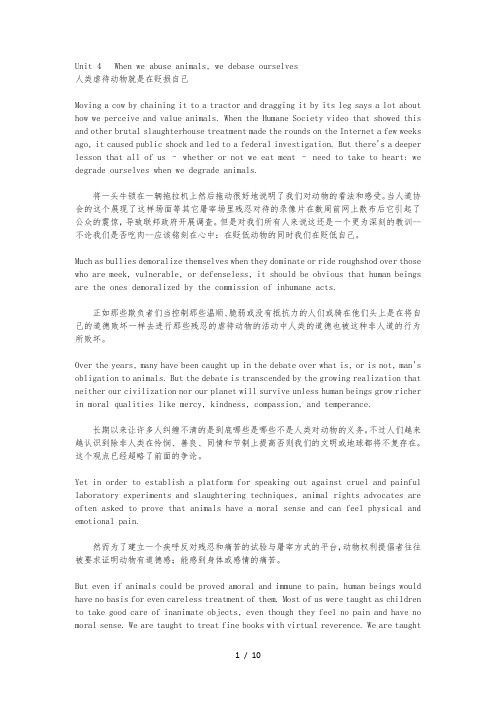
Unit 4 When we abuse animals, we debase ourselves人类虐待动物就是在贬损自己Moving a cow by chaining it to a tractor and dragging it by its leg says a lot about how we perceive and value animals. When the Humane Society video that showed this and other brutal slaughterhouse treatment made the rounds on the Internet a few weeks ago, it caused public shock and led to a federal investigation. But there's a deeper lesson that all of us – whether or not we eat meat – need to take to heart: we degrade ourselves when we degrade animals.将一头牛锁在一辆拖拉机上然后拖动很好地说明了我们对动物的看法和感受。
当人道协会的这个展现了这样场面等其它屠宰场里残忍对待的录像片在数周前网上散布后它引起了公众的震惊,导致联邦政府开展调查。
但是对我们所有人来说这还是一个更为深刻的教训--不论我们是否吃肉--应该铭刻在心中:在贬低动物的同时我们在贬低自己。
Much as bullies demoralize themselves when they dominate or ride roughshod over those who are meek, vulnerable, or defenseless, it should be obvious that human beings are the ones demoralized by the commission of inhumane acts.正如那些欺负者们当控制那些温顺、脆弱或没有抵抗力的人们或骑在他们头上是在将自己的道德败坏一样去进行那些残忍的虐待动物的活动中人类的道德也被这种非人道的行为所败坏。
全新版大学英语综合教程4课文原文及翻译
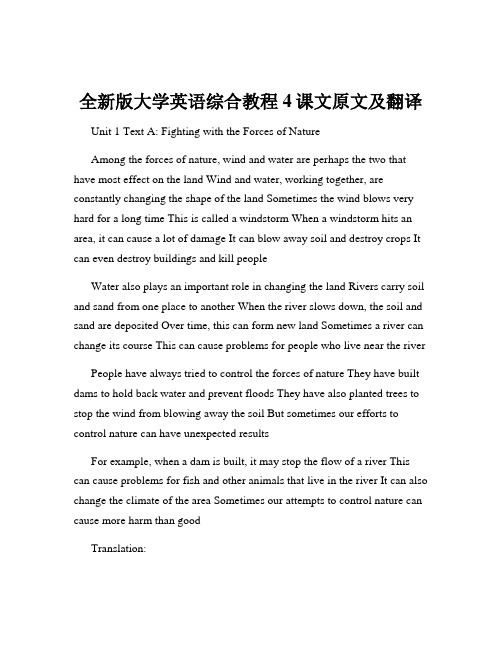
全新版大学英语综合教程4课文原文及翻译Unit 1 Text A: Fighting with the Forces of NatureAmong the forces of nature, wind and water are perhaps the two that have most effect on the land Wind and water, working together, are constantly changing the shape of the land Sometimes the wind blows very hard for a long time This is called a windstorm When a windstorm hits an area, it can cause a lot of damage It can blow away soil and destroy crops It can even destroy buildings and kill peopleWater also plays an important role in changing the land Rivers carry soil and sand from one place to another When the river slows down, the soil and sand are deposited Over time, this can form new land Sometimes a river can change its course This can cause problems for people who live near the riverPeople have always tried to control the forces of nature They have built dams to hold back water and prevent floods They have also planted trees to stop the wind from blowing away the soil But sometimes our efforts to control nature can have unexpected resultsFor example, when a dam is built, it may stop the flow of a river This can cause problems for fish and other animals that live in the river It can also change the climate of the area Sometimes our attempts to control nature can cause more harm than goodTranslation:在自然力量中,风和水也许是对陆地影响最大的两种力量。
全新版大学英语综合教程4第二版Unit7课文翻译

Unit7In the days following the 9/11 terrorist attacks, Daily News staff writer Corky Siemaszko wrote several snapshots of the city's mood at the time. Siemaszko offered similar snapshots on the first few anniversaries of the attacks.Here we present a selection from the series. 9/11恐怖袭击后的数日内,《每日新闻》的专职撰稿人科基•西马兹科撰写了数篇反映纽约市当时氛围的快讯。
在9/11的头几个周年纪念日,西马兹科又写了一些类似的快讯。
下面是从其中选出的几篇Snapshots of New York's Mood after 9/11Corky Siemaszko9/11后纽约氛围写照科基•西马兹科1.DAY OF TERROROriginally published: 9/12/2001The morning coffee was still cooling when our grandest illusion was shattered.Within minutes, one of New York's mightiest symbols was a smoldering mess and the nation's image of invincibility was made a lie.恐怖的一日最初发表于2001年9月12日早晨的咖啡还没有凉,我们最宏伟的幻想却已被粉碎。
在数分钟时间内,纽约最显赫的象征之一成了一堆余烟未尽的废墟,而这个国家不可战胜的形象也成了一个谎言。
2. As the World Trade Center crumpled and the streets filled with screams and scenes of unimaginable horror, choking smoke blotted out the sun and plunged lower Manhattan into darkness.当世界贸易中心倒塌、街道上到处都有人哭叫、充满难以想象的恐怖场景时,令人窒息的烟雾遮住了太阳,使曼哈顿下城区陷入了一片黑暗。
Unit 7 The Monster课文翻译综合教程四
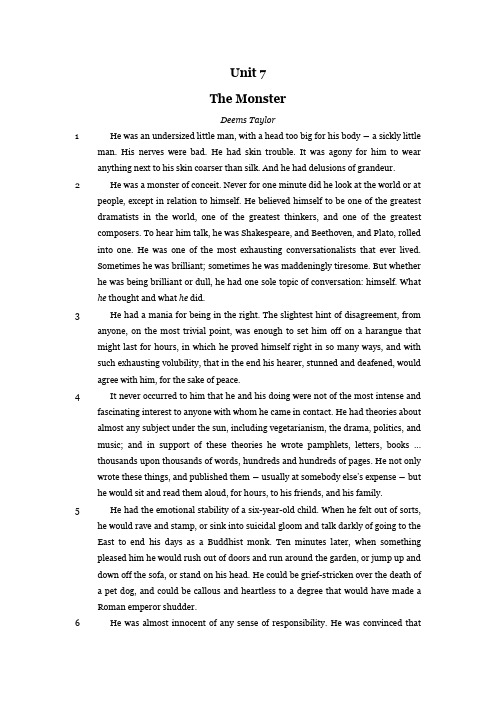
Unit 7The MonsterDeems Taylor1He was an undersized little man, with a head too big for his body ― a sickly little man. His nerves were bad. He had skin trouble. It was agony for him to wear anything next to his skin coarser than silk. And he had delusions of grandeur.2He was a monster of conceit. Never for one minute did he look at the world or at people, except in relation to himself. He believed himself to be one of the greatest dramatists in the world, one of the greatest thinkers, and one of the greatest composers. To hear him talk, he was Shakespeare, and Beethoven, and Plato, rolled into one. He was one of the most exhausting conversationalists that ever lived.Sometimes he was brilliant; sometimes he was maddeningly tiresome. But whether he was being brilliant or dull, he had one sole topic of conversation: himself. What he thought and what he did.3He had a mania for being in the right. The slightest hint of disagreement, from anyone, on the most trivial point, was enough to set him off on a harangue that might last for hours, in which he proved himself right in so many ways, and with such exhausting volubility, that in the end his hearer, stunned and deafened, would agree with him, for the sake of peace.4It never occurred to him that he and his doing were not of the most intense and fascinating interest to anyone with whom he came in contact. He had theories about almost any subject under the sun, including vegetarianism, the drama, politics, and music; and in support of these theories he wrote pamphlets, letters, books ...thousands upon thousands of words, hundreds and hundreds of pages. He not only wrote these things, and published them ― usually at somebody else’s expense ― but he would sit and read them aloud, for hours, to his friends, and his family.5He had the emotional stability of a six-year-old child. When he felt out of sorts, he would rave and stamp, or sink into suicidal gloom and talk darkly of going to the East to end his days as a Buddhist monk. Ten minutes later, when something pleased him he would rush out of doors and run around the garden, or jump up and down off the sofa, or stand on his head. He could be grief-stricken over the death ofa pet dog, and could be callous and heartless to a degree that would have made aRoman emperor shudder.6He was almost innocent of any sense of responsibility. He was convinced thatthe world owed him a living. In support of this belief, he borrowed money from everybody who was good for a loan ― men, women, friends, or strange rs. He wrote begging letters by the score, sometimes groveling without shame, at others loftily offering his intended benefactor the privilege of contributing to his support, and being mortally offended if the recipient declined the honor.7What money he could lay his hand on he spent like an Indian rajah. No one will ever know ― certainly he never knows ― how much money he owed. We do know that his greatest benefactor gave him $6,000 to pay the most pressing of his debts in one city, and a year later had to give him $16,000 to enable him to live in another city without being thrown into jail for debt.8He was equally unscrupulous in other ways. An endless procession of women marched through his life. His first wife spent twenty years enduring and forgiving his infidelities. His second wife had been the wife of his most devoted friend and admirer, from whom he stole her. And even while he was trying to persuade her to leave her first husband he was writing to a friend to inquire whether he could suggest some wealthy woman ― any wealthy woman ― whom he could marry for her money.9He had a genius for making enemies. He would insult a man who disagreed with him about the weather. He would pull endless wires in order to meet some man who admired his work and was able and anxious to be of use to him ― and would proceed to make a mortal enemy of him with some idiotic and wholly uncalled-for exhibition of arrogance and bad manners. A character in one of his operas was a caricature of one of the most powerful music critics of his day. Not content with burlesquing him, he invited the critic to his house and read him the libretto aloud in front of his friends.10The name of this monster was Richard Wagner. Everything I have said about him you can find on record ― in newspapers, in police reports, in the testimony of people who knew him, in his own letters, between the lines of his autobiography.And the curious thing about this record is that it doesn’t matter in the least.11Because this undersized, sickly, disagreeable, fascinating little man was right all the time, the joke was on us. He was one of the world’s greatest dramatists; he was a great thinker; he was one of the most stupendous musical geniuses that, up to now, the world has ever seen. The world did owe him a living. What if he did talk about himself all the time? If he talked about himself for twenty-four hours every day for the span of his life he would not have uttered half the number of words that othermen have spoken and written about him since his death.12When you consider what he wrote ― thirteen operas and music dramas, eleven of them still holding the stage, eight of them unquestionably worth ranking among the world’s great musico-dramatic masterpieces ― when you listen to what he wrote, the debts and heartaches that people had to endure from him don’t seem much of a price.13What if he was faithless to his friends and to his wives? He had one mistress to whom he was faithful to the day of his death: Music. Not for a single moment did he ever compromise with what he believed, with what he dreamed. There is not a line of his music that could have been conceived by a little mind. Even when he is dull, or downright bad, he is dull in the grand manner. Listening to his music, one does not forgive him for what he may or may not have been. It is not a matter of forgiveness. It is a matter of being dumb with wonder that his poor brain and body didn’t burst under the torment of the demon of creative energy that lived inside him, struggling, clawing, scratching to be released; tearing, shrieking at him to write the music that was in him. The miracle is that what he did in the little space of seventy years could have been done at all, even by a great genius. Is it any wonder he had no time to be a man?畸人迪姆斯·泰勒1 他是个大头小身体、病怏怏的矬子;成日神经兮兮,皮肤也有毛病。
新标准英语综合教程4unit7课文全文翻译
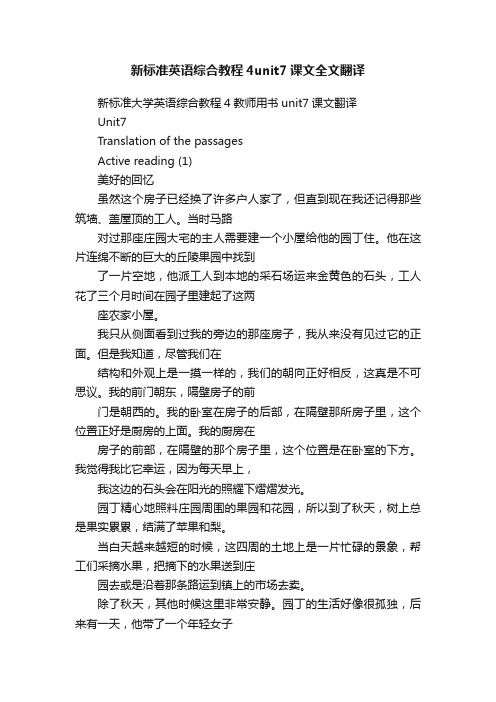
新标准英语综合教程4unit7课文全文翻译新标准大学英语综合教程4教师用书unit7课文翻译Unit7Translation of the passagesActive reading (1)美好的回忆虽然这个房子已经换了许多户人家了,但直到现在我还记得那些筑墙、盖屋顶的工人。
当时马路对过那座庄园大宅的主人需要建一个小屋给他的园丁住。
他在这片连绵不断的巨大的丘陵果园中找到了一片空地,他派工人到本地的采石场运来金黄色的石头,工人花了三个月时间在园子里建起了这两座农家小屋。
我只从侧面看到过我的旁边的那座房子,我从来没有见过它的正面。
但是我知道,尽管我们在结构和外观上是一摸一样的,我们的朝向正好相反,这真是不可思议。
我的前门朝东,隔壁房子的前门是朝西的。
我的卧室在房子的后部,在隔壁那所房子里,这个位置正好是厨房的上面。
我的厨房在房子的前部,在隔壁的那个房子里,这个位置是在卧室的下方。
我觉得我比它幸运,因为每天早上,我这边的石头会在阳光的照耀下熠熠发光。
园丁精心地照料庄园周围的果园和花园,所以到了秋天,树上总是果实累累,结满了苹果和梨。
当白天越来越短的时候,这四周的土地上是一片忙碌的景象,帮工们采摘水果,把摘下的水果送到庄园去或是沿着那条路运到镇上的市场去卖。
除了秋天,其他时候这里非常安静。
园丁的生活好像很孤独,后来有一天,他带了一个年轻女子回家。
我这个房子里顿时充满了欢声笑语和饭菜的香味。
园丁外出干活的时候,他的妻子会照看我周围的花园,种玫瑰、水仙和郁金香,还有夏季植物和菊花。
从早春的鲜花到深秋的深深的金黄色叶子,花园里真是五彩缤纷。
能照看这样一对夫妇,我感觉很幸福。
没过多久,又有孩子要照看了。
头一个孩子是女孩,她常常高兴得咯咯笑,睡得也很沉。
后来又添了一个男孩,他哭起来嗓门很大,让我们大家都不得安宁。
但是他们都很快乐,也很听话。
他们会静静地在屋里或花园里一起玩耍。
渐渐地,他们长大了,也长高了。
最让我感到愉快的一个记忆是:在一个温暖的夏日,我看到男孩高高地坐在苹果树的枝干上,读着他最喜爱的那本书。
新标准大学英语综合教程4(unit1-7)课后答案及课文翻译
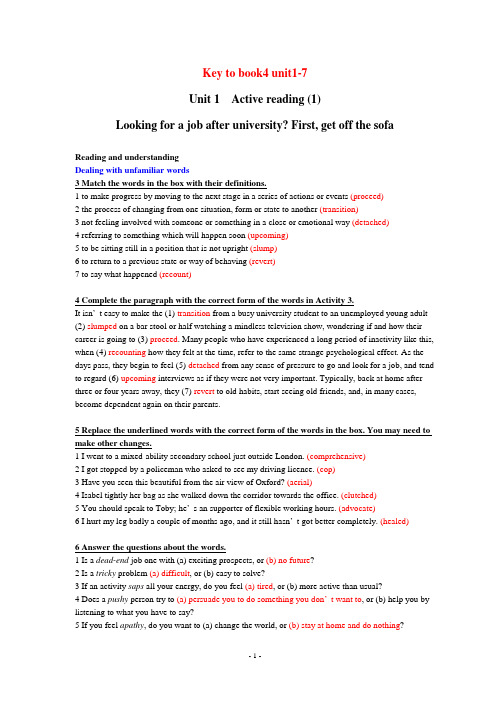
Key to book4 unit1-7Unit 1 Active reading (1)Looking for a job after university? First, get off the sofaReading and understandingDealing with unfamiliar words3 Match the words in the box with their definitions.1 to make progress by moving to the next stage in a series of actions or events (proceed)2 the process of changing from one situation, form or state to another (transition)3 not feeling involved with someone or something in a close or emotional way (detached)4 referring to something which will happen soon (upcoming)5 to be sitting still in a position that is not upright (slump)6 to return to a previous state or way of behaving (revert)7 to say what happened (recount)4 Complete the paragraph with the correct form of the words in Activity 3.It isn’t easy to make the (1) transition from a busy university student to an unemployed young adult (2) slumped on a bar stool or half watching a mindless television show, wondering if and how their career is going to (3) proceed. Many people who have experienced a long period of inactivity like this, when (4) recounting how they felt at the time, refer to the same strange psychological effect. As the days pass, they begin to feel (5) detached from any sense of pressure to go and look for a job, and tend to regard (6) upcoming interviews as if they were not very important. Typically, back at home after three or four years away, they (7) revert to old habits, start seeing old friends, and, in many cases, become dependent again on their parents.5 Replace the underlined words with the correct form of the words in the box. You may need to make other changes.1 I went to a mixed-ability secondary school just outside London. (comprehensive)2 I got stopped by a policeman who asked to see my driving licence. (cop)3 Have you seen this beautiful from the air view of Oxford? (aerial)4 Isabel tightly her bag as she walked down the corridor towards the office. (clutched)5 You should speak to Toby; he’s an supporter of flexible working hours. (advocate)6 I hurt my leg badly a couple of months ago, and it still hasn’t got better completely. (healed)6 Answer the questions about the words.1 Is a dead-end job one with (a) exciting prospects, or (b) no future?2 Is a tricky problem (a) difficult, or (b) easy to solve?3 If an activity saps all your energy, do you feel (a) tired, or (b) more active than usual?4 Does a pushy person try to (a) persuade you to do something you don’t want to, or (b) help you by listening to what you have to say?5 If you feel apathy, do you want to (a) change the world, or (b) stay at home and do nothing?7 Answer the questions about the phrases.1 Is fork out (a) a formal, or (b) an informal way of saying to pay for something?2 If you are in the same boat as another person, are you (a) making the same journey together, or (b) in the same difficult or unpleasant situation?3 If you feel you have come full circle, do you (a) feel you are back where you started, or (b) feel a sense of satisfaction because you have completed something?4 If someone takes a soft line, do they deal with a person (a) in a kind and sympathetic way, or (b) in a lazy way without making a decision?5 If you strike the right note about something, are you expressing yourself (a) well, or (b) badly?6 If you do something by all means, do you (a) try your best to do it, or (b) not care about it?7 If you nudge someone back into the saddle, are you encouraging them to (a) take responsibility again, or (b) take it easy?8 If you talk through a problem with someone, do you (a) examine it carefully and sensitively, or (b) refer to it quickly and then change the subject?Active reading (2)If you ask meDealing with unfamiliar words4 Match the words in the box with their definitions.1 funny or entertaining (amusing)2 used for emphasizing that something good has happened, especially because of good luck (fortunately)3 an amount of money that a person, business or country borrows, usually from a bank (loan)4 to take an amount or number from a total (deduct)5 the most exciting, impressive, or interesting part of an event (highlight)6 to show that you understand someone’s problems (sympathize)7 needing a lot of time, ability, and energy (demanding)5 Complete the conversation with the correct form of the words in Activity 4.A After three years at university, I’m now quite heavily in debt.B I (1) sympathize with you, I know what it’s like to have financial problems. But (2) fortunately I didn’t need to take out a student (3) loan when I was at university, because I had a part-time job.A What did you do?B I worked in a restaurant at weekends.A That must have been very (4) demanding.B Yes, it was. I had to get the right balance between work and study. But the other people who worked there were good fun to be with, so it was quite (5) amusing too. The (6) highlight of the weekend was always Saturday night when we worked overtime.A But I don’t expect you made a lot of money?B No, there wasn’t much after they’d (7) deducted tax and pension contributions. But it was enough to keep me going.6 Replace the underlined words with the correct form of the words in the box. You may need to make other changes.1 When I was at college I kept all my personal things in an old cupboard.2 A lot of people who leave university before getting a degree end up in good jobs.3 I think she’ll get a good degree, but I wouldn’t risk my money on the exact result.4 The money I spent at college was more than what I earned in my part-time job.5 The chances of my being offered a job after that interview must be quite remote.6 Our business has done very well since we changed our advertising.7 I think telling the truth and not cheating is always the best policy.Key:(1) belongings (2) dropouts (3) gamble (4) exceeded (5) odds(6) has thrived (7) honesty7 Answer the questions about the words and expressions.1 If something is not all it’s cracked up to be, is it (a) valid and interesting, or (b) just a little bit disappointing?2 If someone keeps banging on about something, are you likely to be (a) interested in, or (b) bored by what they say?3 If there is a lot of hassle in your life, are you likely to feel (a) stressed, or (b) relaxed?4 If something happens out of the blue, is it (a) unexpected, or (b) part of your plan?5 If you say you ended up in a particular job, do you suggest that (a) you have fulfilled your ambition, or (b) it happened almost by chance?6 Are the regulars in a pub (a) the customers who come very often, or (b) the food the pub offers most often?7 If something is dead easy, is it (a) very easy, or (b) not easy at all?8 If you treat someone to something, do you (a) buy something nice for them, or (b) behave badly to them?9 If you cheer a place up, do you (a) make the place look brighter, or (b) make the people in the place happier?Reading and interpreting8 Look at the sentences from the passage and identify the style features.1 Twelve years at school and three years at university, teachers banging on about opportunities in the big wide world beyond our sheltered life as students, and what do I find?This shows the informality of an incomplete sentence in the first part, the use of an informal expression (banging on) and a rhetorical question to the reader (What do I find?)2 Try as I might to stay cheerful, all I ever get is hassle, sometimes with people (especially boys, god, when will they grow up?) …This has the use of an informal word (hassle), an informal exclamation (god) and a question to the reader (When will they grow up?)3 Actually, I had my eye on the course at the London School of Economics (LSE).Here there is a discourse marker typical of speech (Actually) and an informal phrase (had my eye on).4 I kind of understand it, and not just because my degree is in economics.Here “kind of” is a sort of discourse marker of informal speech (showing something is general,vague or not definite).5 I wanted something in finance and investments, because you know, maybe with a job like that, I could use my degree.This has a discourse marker of informal speech (you know).6 ... it’s true, he really did seem to have three hands.Again here is a discourse marker of informal speech (it’s true).7 I talked to him about ... well, about pretty well everything …This has another discourse marker of informal speech (well) and an informal phrase (pretty well). Language in useword formation: compound nouns1 Write the compound nouns which mean:1 a degree which is awarded a first class (a first-class degree)2 work in a hospital (hospital work)3 a ticket for a plane journey (a plane ticket)4 a discount for students (a student discount)5 a pass which allows you to travel on buses (a bus pass)6 a room where an interview is held (an interview room)7 a period spent in training (a training period)word formation: noun phrases2 Write the noun phrases which mean:1 a career which is rewarding from the financial point of view (a financially rewarding career)2 legislation which has been introduced recently (recently introduced legislation)3 instructions which are more complex than usual (unusually complex instructions)4 an institution which is orientated towards academic (academically orientated work)5 work which makes physical demands on you (physically demanding work)6 information which has the potential to be important (potentially important information)7 candidates who have been selected after a careful procedure (carefully selected candidates)8 a coursebook in which everything has been planned beautifully (a beautifully planned textbook)try as … might3 Rewrite the sentences using try as … might .1 I’m trying to fill this last page, but I just can’t think of anything.Try as I might to fill this last page, I just can’t think of anything.2 I try to be friendly with Marta, but she doesn’t seem to respond.Try as I might to be friendly with Marta, she doesn’t seem to respond.3 I try hard to get to sleep, but I can’t help thinking about my family.Try as I might to get to sleep, I can’t help thinking about my family.4 He just doesn’t seem to get the promotion he deserves, even though he keeps trying.Try as he might, he just doesn’t seem to get the promotion he deserves. / Try as he might to get the promotion he deserves, he just doesn’t seem to get it.5 I keep trying to remember her name, but my mind is a blank.Try as I might to remember her name, my mind is a blank.given that …4 Rewrite the sentences using given that …1 Since I know several languages, I thought I would look for work abroad.Given that I know several languages, I thought I would look for work abroad.2 Xiao Li has the best qualifications, so she should get the job.Given that Xiao Li has the best qualifications, she should get the job.3 Since we’re all here, I think it would be a good idea to get down to some work.Given that we’re all here, I think it would be a good idea to get down to some work.4 Since it’s rather late, I think we should leave this last task until tomorrow.Given that it’s rather late, I think we should leave this last task until tomorrow.clauses introduced by than5 Rewrite the sentences using clauses introduced by than .1 She’s experienced at giving advice. I’m more experienced.She’s less experienced at giving advice than I am. / I’m more experienced at giving advice than she is.2 You eat too much chocolate. It isn’t good for you.You eat too much chocolate than is good for you.3 She worked very hard. Most part-timers don’t work so hard.She worked harder than most part-timers do.4 You have arrived late too many times. That isn’t acceptable.You have arrived late more times than is acceptable.5 I don’t think you should have given so much personal information. It isn’t wise.I think you have given more personal information than is wise.collocations6 Read the explanations of the words. Answer the questions.1 highlight A highlight is the most exciting, impressive, or interesting part of an event.(a) What would you like to be the highlight of your career?I would like the highlight of my student career to be to receive a national award for the best student research project.(b) How can you highlight an important sentence in a text?You can underline it in pencil or pen or you can use coloured pens or highlighters.(c) What are the edited highlights of a football match?The highlights are when someone scores a goal or prevents one from being scored.2 loan A loan is an amount of money someone borrows from someone else.(a) Have you ever taken out a loan?No, I haven’t. But my parents have taken out several loans to buy kitchen equipment.(b) What is the best way to pay off a loan?It is best to pay a loan off quickly, although you will still have to pay some interest.(c) If you have a library book on loan, what do you have to do with it?You have to return it before the date it is due, otherwise you may have to pay a fine.3 thrive To thrive means to be very successful, happy or healthy.(a) What sort of business thrives best in your part of the country?In my part of the country, light industries and electronics companies thrive.(b) Which sort of plants thrive in a hot climate?In a hot climate you can see tropical fruit and vegetables thrive and also tropical plants and trees. (c) Why do you think some couples thrive on conflict?It is difficult to understand why some couples thrive on conflict. Maybe each one wants to compete with the other or maybe they enjoy “kissing and making up” after the conflict.7 Translate the paragraphs into Chinese.If you ask me, real life is not all it’s cracked up to be. Twelve years at school and three years at university, teachers banging on about opportunities in the big wide world beyond our sheltered life as students, and what do I find?Try as I might to stay cheerful, all I ever get is hassle, sometimes with people (especially boys, god, when will they grow up?), but mostly with money. It’s just so expensive out here! Everyone wants a slice off you. The Inland Revenue wants to deduct income tax, the bank manager wants repayments on my student loan, the landlord wants the rent, gas, water, electricity and my mobile bills keep coming in, a nd all that’s before I’ve had anything to eat. And then some bright spark calls me out of the blue, asking if I’m interested in buying a pension. At this rate, I won’t even last till the end of the year, let alone till I’m 60.(☞翻译时可以根据上下文增译,即增加原文暗含了但没有直接表达出来的意思。
综合英语教程4 第7单元Time to Stop Excuses for Lateness 课文答案、翻译等 很全面
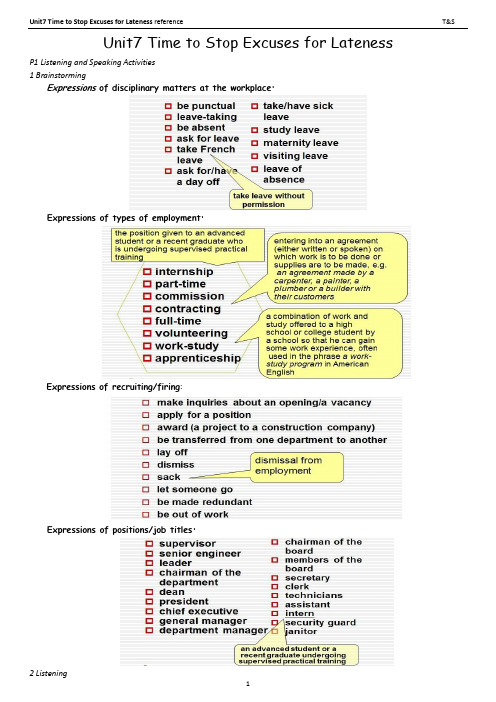
Unit7 Time to Stop Excuses for Lateness P1 Listening and Speaking Activities1 BrainstormingExpressions of disciplinary matters at the workplace:Expressions of types of employment:Expressions of recruiting/firing:Expressions of positions/job titles:2 ListeningListening scriptI'm a policeman in New York City and my name is John Davy. Ever since I was a young boy I’ve always wanted to be a cop .I thought it would be the best job in the world. If I wasn't a cop, I don't think I could be anything else. Of course they tell me I'm a good cop. My superiors say I'm conscientious, that I have strong sense of justice and fairness and a great respect for the law. To be honest with you, my conscience would bother me if I didn't give 100% and if I didn't try to live up to my ideals. My friends tell me I'm too idealistic, too nice and, as the saying goes, nice guys finish last , but my job is to serve the people and I try to do my best.I work with the police department's emergency service patrol in a largely black neighborhood in Brooklyn, New York. It's a rough and dangerous neighborhood, very rough. I admit it hasn't been easy. Since being assigned to the neighborhood, I've been shot, spit at, and hit with bottles, rocks, sticks, and Molotov Cocktails . Yes, it's not easy being a cop in New York City , but I've been awarded citations for my courage and for my quick thinking and performance in emergency situations.Oh, I could tell you many exciting stories. Once, we set up a net for a potential jumper. A young man was on a ledge 23 stories up from the street. His girlfriend had left him and now he was threatening to jump. We got his girlfriend, his close friend, a priest, his mother to try and talk him out of jumping, but nothing worked. He was going to jump. Then I started to talk to him. I talked as long as I could — until I got too close to him. Then he shouted out, "Stop right where you are or I'll jump." I backed away. An hour later, with a belt tied around me, with a line my partner held, I jumped from the ledge and came up right in front of the young man and trapped him. I felt what they call "job satisfaction". A life has been saved and that's important to me. To me that's success - to do your job and to do it well. No holding back , especially when it means saving a human life.Some people in the neighborhood think cops are the bad guys. They just don't like us. Yeah, we have some bad cops in the department who don't always obey the rules and who sometimes use too much force and injure people. But you know, when someone has been hit by a car and you walk into the crowd standing around dumbfounded and you take charge, telling this person to get a blanket, this one to get some water, and you comfort the injured person; that looks good in front of the crowd. They say, "There’re some good cops here." Boy, does that make me feel good. I feel like I'm doing my job . I feel like I'm helping people. Anyway, it's my duty as a cop.Recently, I was again cited for outstanding service and this time was promoted to sergeant. As they say, I'm a good cop, and good guys don't always finish last.1. What makes John a good policeman?John likes his job as a cop. He feels it's "the best job in the world." He is conscientious, has a strong sense of justice and fairness, and respects the law. John exerts himself to the utmost and tries to live up to his ideals.2. Has John’s job as a policeman been easy and safe?No. Being a policeman in New York is difficult and dangerous. Besides, he works in a rough neighborhood. He has been shot, spit at, and hit with bottles, rocks, sticks, and Molotov Cocktails. Once he risked his life to save a man from jumping off a ledge 23 stories up from the street.3. Why was John awarded citations?John is given awards for his bravery, his quick thinking and performance in emergencies.4. Why don’t some people like policemen in John’s district?John admits that there are bad cops on the force, cops who don't always obey the rules and who sometimes use too much force and injure people.Text Translation别再为迟到找借口哈里·贝地每个办公室总有那么几个人习惯上班迟到。
新世纪大学英语综合教程4课文翻译Unit4-unit7
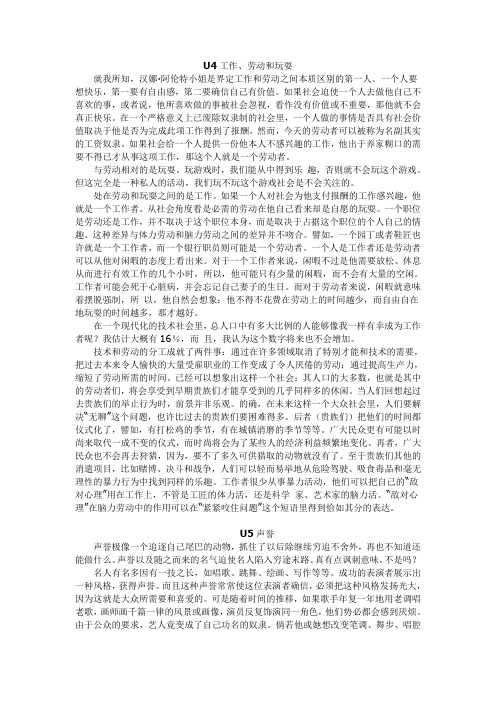
U4工作、劳动和玩耍就我所知,汉娜·阿伦特小姐是界定工作和劳动之间本质区别的第一人。
一个人要想快乐,第一要有自由感,第二要确信自己有价值。
如果社会迫使一个人去做他自己不喜欢的事,或者说,他所喜欢做的事被社会忽视,看作没有价值或不重要,那他就不会真正快乐。
在一个严格意义上已废除奴隶制的社会里,一个人做的事情是否具有社会价值取决于他是否为完成此项工作得到了报酬。
然而,今天的劳动者可以被称为名副其实的工资奴隶。
如果社会给一个人提供一份他本人不感兴趣的工作,他出于养家糊口的需要不得已才从事这项工作,那这个人就是一个劳动者。
与劳动相对的是玩耍。
玩游戏时,我们能从中得到乐趣,否则就不会玩这个游戏。
但这完全是一种私人的活动,我们玩不玩这个游戏社会是不会关注的。
处在劳动和玩耍之间的是工作。
如果一个人对社会为他支付报酬的工作感兴趣,他就是一个工作者。
从社会角度看是必需的劳动在他自己看来却是自愿的玩耍。
一个职位是劳动还是工作,并不取决于这个职位本身,而是取决于占据这个职位的个人自己的情趣。
这种差异与体力劳动和脑力劳动之间的差异并不吻合。
譬如,一个园丁或者鞋匠也许就是一个工作者,而一个银行职员则可能是一个劳动者。
一个人是工作者还是劳动者可以从他对闲暇的态度上看出来。
对于一个工作者来说,闲暇不过是他需要放松、休息从而进行有效工作的几个小时,所以,他可能只有少量的闲暇,而不会有大量的空闲。
工作者可能会死于心脏病,并会忘记自己妻子的生日。
而对于劳动者来说,闲暇就意味着摆脱强制,所以,他自然会想象:他不得不花费在劳动上的时间越少,而自由自在地玩耍的时间越多,那才越好。
在一个现代化的技术社会里,总人口中有多大比例的人能够像我一样有幸成为工作者呢?我估计大概有16%,而且,我认为这个数字将来也不会增加。
技术和劳动的分工成就了两件事:通过在许多领域取消了特别才能和技术的需要,把过去本来令人愉快的大量受雇职业的工作变成了令人厌倦的劳动;通过提高生产力,缩短了劳动所需的时间。
新世纪大学英语综合教程4 课文翻译
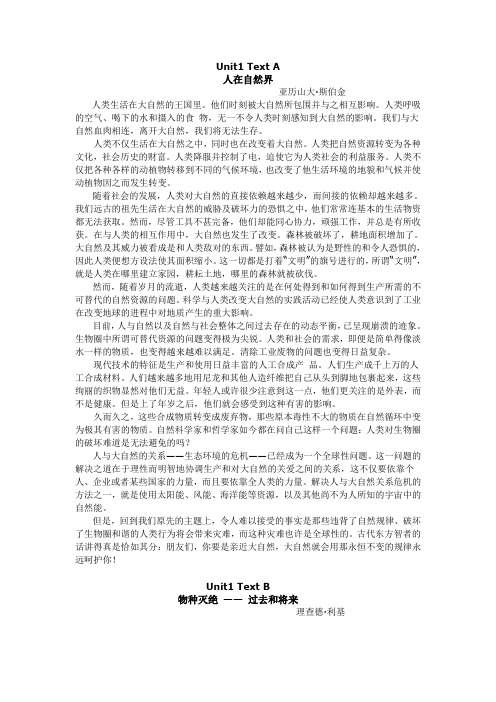
Unit1 Text A人在自然界亚历山大·斯伯金人类生活在大自然的王国里。
他们时刻被大自然所包围并与之相互影响。
人类呼吸的空气、喝下的水和摄入的食物,无一不令人类时刻感知到大自然的影响。
我们与大自然血肉相连,离开大自然,我们将无法生存。
人类不仅生活在大自然之中,同时也在改变着大自然。
人类把自然资源转变为各种文化,社会历史的财富。
人类降服并控制了电,迫使它为人类社会的利益服务。
人类不仅把各种各样的动植物转移到不同的气候环境,也改变了他生活环境的地貌和气候并使动植物因之而发生转变。
随着社会的发展,人类对大自然的直接依赖越来越少,而间接的依赖却越来越多。
我们远古的祖先生活在大自然的威胁及破坏力的恐惧之中,他们常常连基本的生活物资都无法获取。
然而,尽管工具不甚完备,他们却能同心协力,顽强工作,并总是有所收获。
在与人类的相互作用中,大自然也发生了改变。
森林被破坏了,耕地面积增加了。
大自然及其威力被看成是和人类敌对的东西。
譬如,森林被认为是野性的和令人恐惧的,因此人类便想方设法使其面积缩小。
这一切都是打着“文明”的旗号进行的,所谓“文明”,就是人类在哪里建立家园,耕耘土地,哪里的森林就被砍伐。
然而,随着岁月的流逝,人类越来越关注的是在何处得到和如何得到生产所需的不可替代的自然资源的问题。
科学与人类改变大自然的实践活动已经使人类意识到了工业在改变地球的进程中对地质产生的重大影响。
目前,人与自然以及自然与社会整体之间过去存在的动态平衡,已呈现崩溃的迹象。
生物圈中所谓可替代资源的问题变得极为尖锐。
人类和社会的需求,即便是简单得像淡水一样的物质,也变得越来越难以满足。
清除工业废物的问题也变得日益复杂。
现代技术的特征是生产和使用日益丰富的人工合成产品。
人们生产成千上万的人工合成材料。
人们越来越多地用尼龙和其他人造纤维把自己从头到脚地包裹起来,这些绚丽的织物显然对他们无益。
年轻人或许很少注意到这一点,他们更关注的是外表,而不是健康。
新世纪大学英语综合教程4课文翻译Unit4-unit7汇总

U4工作、劳动和玩耍就我所知,汉娜 ·阿伦特小姐是界定工作和劳动之间本质区别的第一人。
一个人要想快乐,第一要有自由感,第二要确信自己有价值。
如果社会迫使一个人去做他自己不喜欢的事,或者说,他所喜欢做的事被社会忽视,看作没有价值或不重要,那他就不会真正快乐。
在一个严格意义上已废除奴隶制的社会里,一个人做的事情是否具有社会价值取决于他是否为完成此项工作得到了报酬。
然而,今天的劳动者可以被称为名副其实的工资奴隶。
如果社会给一个人提供一份他本人不感兴趣的工作,他出于养家糊口的需要不得已才从事这项工作,那这个人就是一个劳动者。
与劳动相对的是玩耍。
玩游戏时,我们能从中得到乐趣,否则就不会玩这个游戏。
但这完全是一种私人的活动,我们玩不玩这个游戏社会是不会关注的。
处在劳动和玩耍之间的是工作。
如果一个人对社会为他支付报酬的工作感兴趣,他就是一个工作者。
从社会角度看是必需的劳动在他自己看来却是自愿的玩耍。
一个职位是劳动还是工作, 并不取决于这个职位本身, 而是取决于占据这个职位的个人自己的情趣。
这种差异与体力劳动和脑力劳动之间的差异并不吻合。
譬如,一个园丁或者鞋匠也许就是一个工作者, 而一个银行职员则可能是一个劳动者。
一个人是工作者还是劳动者可以从他对闲暇的态度上看出来。
对于一个工作者来说,闲暇不过是他需要放松、休息从而进行有效工作的几个小时,所以,他可能只有少量的闲暇,而不会有大量的空闲。
工作者可能会死于心脏病,并会忘记自己妻子的生日。
而对于劳动者来说,闲暇就意味着摆脱强制,所以,他自然会想象:他不得不花费在劳动上的时间越少,而自由自在地玩耍的时间越多,那才越好。
在一个现代化的技术社会里, 总人口中有多大比例的人能够像我一样有幸成为工作者呢?我估计大概有 16%,而且,我认为这个数字将来也不会增加。
技术和劳动的分工成就了两件事:通过在许多领域取消了特别才能和技术的需要, 把过去本来令人愉快的大量受雇职业的工作变成了令人厌倦的劳动;通过提高生产力, 缩短了劳动所需的时间。
- 1、下载文档前请自行甄别文档内容的完整性,平台不提供额外的编辑、内容补充、找答案等附加服务。
- 2、"仅部分预览"的文档,不可在线预览部分如存在完整性等问题,可反馈申请退款(可完整预览的文档不适用该条件!)。
- 3、如文档侵犯您的权益,请联系客服反馈,我们会尽快为您处理(人工客服工作时间:9:00-18:30)。
7A
1|返朴归真| 琳达·韦尔特纳“我们讨论的是简化生活,而不是物质匮乏,”我的朋友萨拉解释说,“绝对不是你不可以做你喜欢的那些事情,而是你在改变,不再喜欢同样的事情罢了。
一些旧的习惯看上去是那样的浪费又不能令人满意,你真的对它们失去了兴趣。
所以你仍然拥有你需要的每一件东西——只不过不需要花那么多的钱罢了。
”
2当我第一次遇见他们时,萨拉和迈克尔夫妇双双从业,拥有自己的住宅和用一大笔贷款购置的一条大船。
随着女儿的出世而他们又想亲自抚养她,他们开始对“自愿简朴”的理念产生了兴趣。
他们俩谁都不愿意把他们视为生活中最重要的部分仅仅局限于上班前的一小段时间和下班后已疲惫不堪的那几个小时。
3“许多人认为,因为有了孩子而且东西越来越贵,唯一的办法就是更加努力地工作以便挣更多的钱。
其实这并不是唯一的办法,”迈克尔坚持说。
4这对夫妻的决定是把两份全职工作业换成两份半日工作,并且削减消费。
他们决定只把钱花在有助于实现他们的主要目标的东西上:构建一个把家庭和友谊、工作和娱乐融为一体的生活天地,而且还是一个不浪费地球资源的生活天地。
5现在他们还在原来的那个近郊社区,住在一幢自己设计的、漂亮而节能的房子里。
按许多标准来看,房子虽然小了点,却容易清扫、布置、维修和供暖。
一层是个大房间,厨房靠墙,摆着一张桦木餐桌和吃饭用的几把椅子;一张舒适的长沙发和一个柴炉就把日常起居的范围圈定了;角落是工作区。
楼上是他们的卧室、一个萨拉和迈克尔共用的办公室和一间浴室。
整幢房子明亮简洁,同周围环境十分和谐。
很快,前门外还要建一个太阳能温室。
6一对只有兼职工作的夫妻怎么会有钱建造自己的房子、拥有一辆汽车并同另一对夫妻共享一艘小船,而且所有这一切都不曾贷款呢?他们如何能够维持足以提供他们想要的“一切”的那样一种高生活水平呢?他们放弃的而且不再怀念是哪些东西呢?
7首先,他们放弃了乱七八糟的昂贵东西:(浴室)药柜里满满的从来不用的化妆品和在柜台上随时可以买到的药品;堆放在厨房壁柜里的最终只会丢弃的各种东西。
萨拉和迈克尔共用的那个衣柜足可以装下他们必需的一些衣物,其中许多还是出自L·L·比恩公司的做工精细的经典款式呢。
“我不断地把东西送给别人,”萨拉解释道。
通过筛选和丢弃并凭借他们对所拥有的东西的了解,萨拉和迈克尔清楚地知道他们到底真正需要什么。
8他们没有洗碟机,他们家那几只手工陶制的碟子根本装不满一台洗碟机。
他们没有衣服烘干机;冬天把湿衣服晾在室内也就不需要增湿器了。
萨拉的黑发很短,所以用不着吹风机、电动卷发夹或电动烫发钳。
他们的前院长满了树,所以也不需要动力割草机或电动修枝剪。
他们没有电视机,所以他们和孩子的脑子里都不会一直充满各种新玩具、新物品和新诱惑的图像。
9他们节省了通勤时代上下班必须支付的开支:另外的一辆车、汽油费、职业装、午餐和经常外出吃晚餐的开销以及保姆费,换来的则是时间——用于关注生活质量的时间。
他们已不再使用纸产品,不再吃加工过的食品,不再享受昂贵的嗜好、观看首映电影、上餐馆以及付钱接受别人的服务。
取而代之的是他们所喜欢的自家烹饪、周中的家庭野餐、上图书馆借书、参加社区的艺术活动、逛廉价旧货商店以及自己动手做事。
10“那种渴望获得更多东西的感觉是我们这个文化的一个重要组成部分,而且还会永远继续下去,”萨拉说。
“但是,你赚1万5千美元还是5万美元并不重要。
这世上总有许多你希望自己能买得起的东西。
钱真的不是导致我们改变生活方式的原因。
我们这样做是为了个人的满足。
对于任何一个想简化自己生活的人来说,基本规则只有一个:如果一件事不能令人满意,那就索性不要去做。
”
11萨拉和迈克尔借给我一本手册,名为《营造简朴生活方式的99种方法》,里面全是适用于任何生活状况的实用可行的建议。
我仔细地阅读了,在一些方面我给自己打了高分,而在另一些方面我为身上存在的社会所认可的不理智行为感到惊讶。
12那天晚上,我陪女儿去购物,碰巧看见一条和我们的厨房墙纸颜色匹配而价钱又不贵的擦手毛巾和一双漂亮得难以抵挡其诱惑的“特价”凉鞋。
当我站在停车场时,感觉自己花了11美元离开商店之后并没有比进商店时更加开心,此时此刻我觉得自己就像个孩子,面对自己的一时冲动竟会不由自主。
13我们乘坐的这只购物旋转木马,其实是一个幻觉世界,但由于它不停地旋转并富有刺激性,有时我们很难找到决心和勇气从木马上下来。
7B
1|我的俭朴生活| 在我五十出头的时候,我开始怀疑丈夫和我所过的生活。
我渴望一种更简单的生活方式,不想要太多压力,而且厌倦了为过奢华生活而终日奔波忙碌的日子。
2为了达成目标,最理智而且最有把握的方式就是永久地离开公司圈子,然后能够坦然地处理其后果。
确实,这是很多人都无法解决的一件棘手事儿。
但是在丈夫的支持下,而我认为自己是个有能力处理好这件事情后果的人,于是我挥手告别了公司圈子,而且从来也没有为此而后悔。
3经过前两周的休息,恢复以及深思后,我开始把需要改变的东西一一列在纸上,包括仔细管理丈夫继续带给我们生活的钱财以及在我们原来的基础上再寻找一些其他赚钱或增加收入的新门路。
4有些决定显然很容易做出,譬如取消长期固定的每周去一次美容院护发和修指甲的预约,或者过去由于没时间做饭而每周出去吃好几顿饭的惯例。
但即使那样,我觉得这只不过是冰山的一角。
5第一个重大决定就是卖掉我们的房子,因为那房子对于我们两个来说确实太大而且太奢华。
有四个卧室和四个浴室的豪宅对于两个想过简单生活的人来说完全没有必要。
三千多平方英尺的房子卖得相当快。
我们搬进了一个较小而且去丈夫的工作单位也非常便利的家。
然后我就开始精简我们的家当了。
那或许是工作量最大的一项任务,而且需要几次旧物甩卖和寄售。
6我们搬家后,接下来就进入了让自己在一个小房子里过上称心快乐生活的调整期,这个调整的确让我们花了一些时间来适应。
我丈夫不在乎我们住什么样的房子。
但我在开始时却遇到了一些困难,因为根据我们先前的生活方式,没有一件东西摆放到位。
当我把房子的每寸空间都派上用场时,我发现还有很多东西没地方放。
房子小了就意味着东西也得少,也就是意味着需要打扫和操心的东西也要少!为了避免杂乱,减少没用的东西,我制定了一条规则,那就是:我必须得在所有食橱和衣柜周围看到三面内壁。
7同时,我也开始着手处理由于以前没有制定过有效的节省计划而导致的经济方面的问题。
我开始意识到如果不好好盘算如何花钱的话,我可能会把很多的钱浪费掉。
我发现,只有注意存小钱,才会积累出大钱。
我尽量削减所有不必要的支出,因为我要确保自己我无需再重返劳务市场找工作。
8我觉得自己只需要两条牛仔裤,一条平常穿,一条好点的。
只需要两三双鞋子,一件休闲茄克和一件时髦的上衣等。
9我还意识到,没有必要订阅杂志或者报纸,因为有电脑和电视,无需增加开销就足以满足我的需求了。
10我发现,如果我把每天的零钱节省下来,而不是放在钱包里花掉,我就能防止一部分钱从我的手里溜掉。
每个月,我就能积攒一些零钱并且把它存在银行我们的储蓄账户里。
11我觉得我们不需要两部车,如果我把出去办事的时间计划好的话。
裁掉一部车也减少了分期付款、购买燃料、办理驾照、各种税费等方面的开支。
12我意识到我们只需要一张信用卡。
我意识到日常开支比如买汽油时支付现金要比写支票或者用信用卡支付节省的多。
13我意识到如果我能控制住日常生活开支和信用卡上钱的流量的话,我就能更好地确保我兜里有多少钱,从而减少每个月的开销。
对我来说,说到理财,用信用卡会滋生疏忽大意,而我手里冷冰冰、硬邦邦的现金很可能还会留在我的手里。
14我意识到,我们没有必要每年花一千美金为朋友和家庭成员购置礼物和举办假日聚会。
如果全年都认真计划,并且留意购买廉价商品的话,只要用一小部分开支我们就能很好地满足那些需要了。
15现在,我们的生活方式很简单,很节俭,但是对于我们自己或者我们想做的事情来说也不算是吝啬。
我们在生活“所需”的期望从我们“想要”的东西中分离出来了,而且我们也知道这两者之间的差别。
现在我们的生活中没有了过度的压力和焦虑,我们比以前生活得更幸福。
我制定了一项财务计划,有了它我们可以生活得很舒适,我们知道,我们的将来有保障,因为我们有把握。
我们期待着每个新的一天,那是上帝赐给我们的福气。
